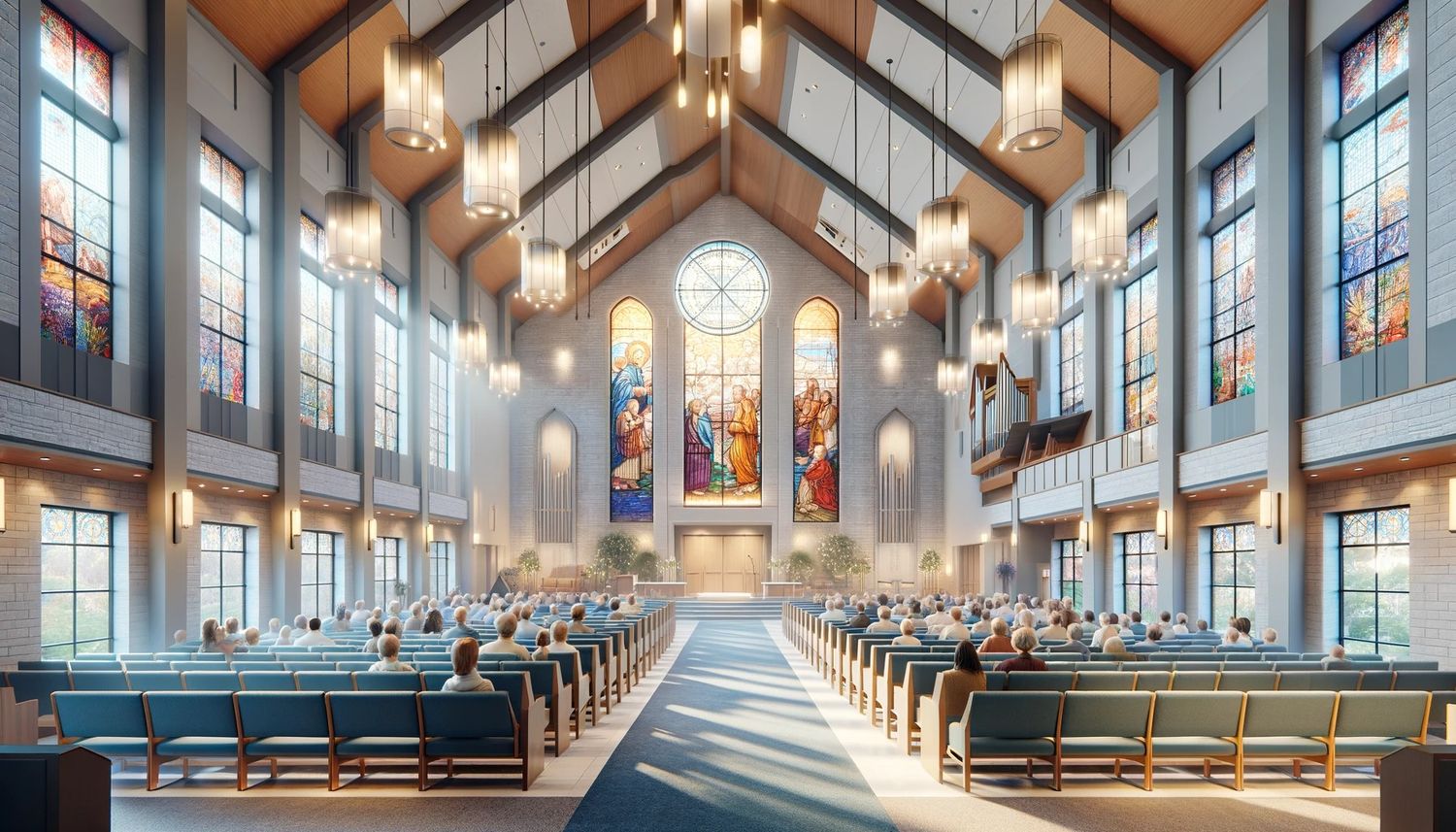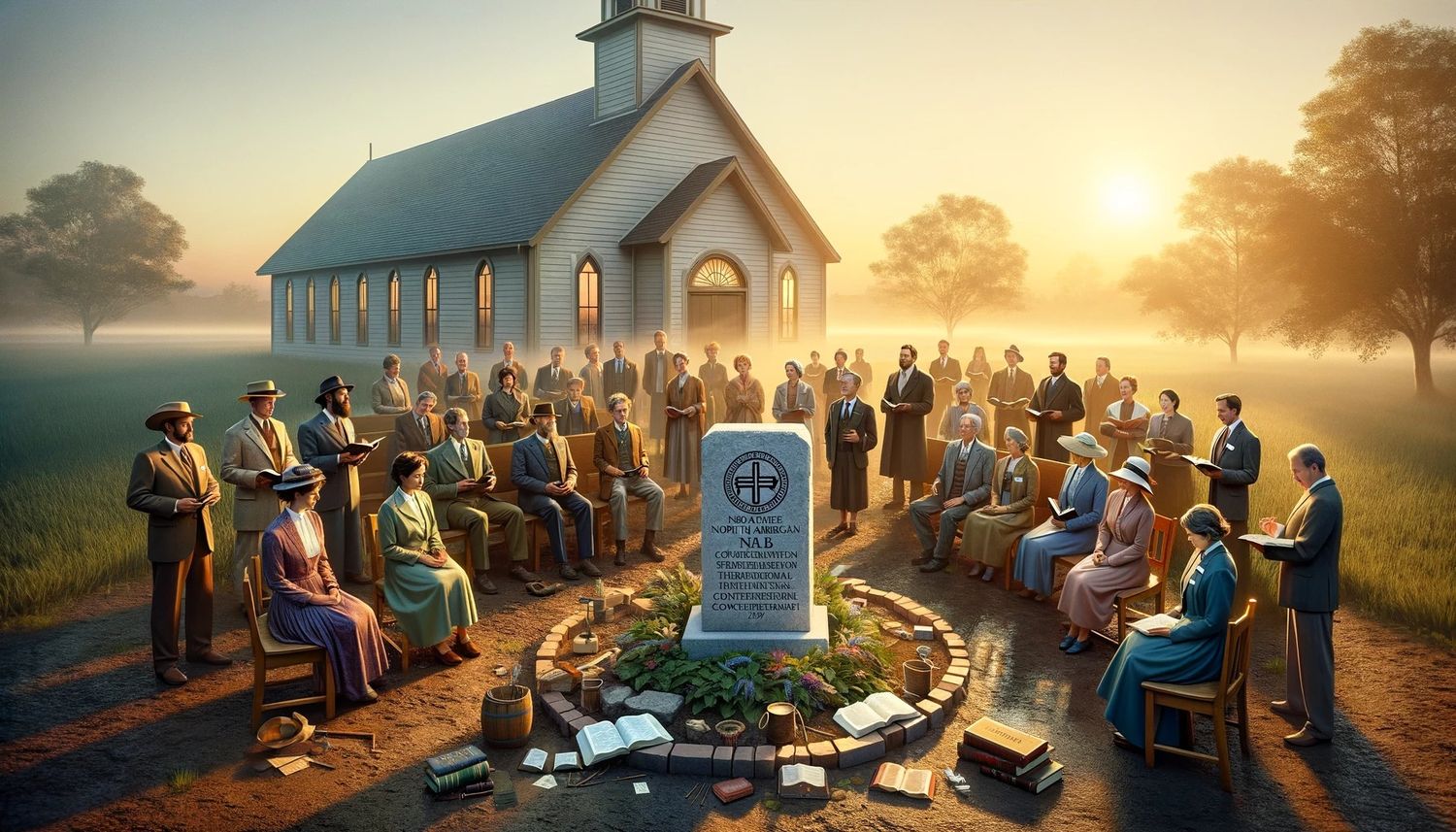Home>Theology and Spirituality>What Is The Lutheran Church


Theology and Spirituality
What Is The Lutheran Church
Published: March 3, 2024
Ericka Andersen, an editor at Christian.net, expertly merges digital strategy with content creation, focusing on faith and societal issues. Her communication skills enhance the platform's engaging narratives, fostering meaningful dialogue on belief's impact on society.
Discover the theology and spirituality of the Lutheran Church, including its beliefs, practices, and history. Learn about the core principles and teachings that guide Lutheran faith and worship.
(Many of the links in this article redirect to a specific reviewed product. Your purchase of these products through affiliate links helps to generate commission for Christian.net, at no extra cost. Learn more)
Table of Contents
History of the Lutheran Church
The Lutheran Church has a rich and complex history that dates back to the 16th century. It all began with a German monk named Martin Luther, who, in 1517, famously nailed his 95 Theses to the door of the Castle Church in Wittenberg, Germany. This act sparked the Protestant Reformation, a movement that sought to reform the Roman Catholic Church. Luther's teachings and the resulting Reformation led to the establishment of the Lutheran Church as a separate Christian denomination. The Lutheran Church traces its roots to this pivotal moment in history, and its development has been shaped by a series of events and influential figures over the centuries.
Key Events in the History of the Lutheran Church
-
The Diet of Worms (1521): Martin Luther's refusal to recant his beliefs at the Diet of Worms marked a significant turning point in the Reformation. His steadfast commitment to his convictions solidified the split from the Roman Catholic Church and laid the groundwork for the formation of the Lutheran Church.
-
The Augsburg Confession (1530): This document, written by Lutheran theologians, outlined the key beliefs and practices of the Lutheran Church. It served as a defining statement of Lutheran faith and became a foundational text for the denomination.
-
The Peace of Augsburg (1555): This treaty formally recognized the Lutheran Church and allowed rulers in the Holy Roman Empire to choose between Catholicism and Lutheranism for their territories, granting a degree of religious freedom to Lutheran followers.
-
The Thirty Years' War (1618-1648): This devastating conflict, which involved religious and territorial disputes, had a profound impact on the Lutheran Church and the broader religious landscape of Europe. It highlighted the deep divisions between Catholic and Protestant factions and reshaped the political and religious dynamics of the time.
Spread of Lutheranism
The influence of the Lutheran Church extended beyond Germany, as the teachings of Martin Luther gained traction in other parts of Europe and eventually made their way to the Americas through immigration and missionary efforts. Lutheran traditions and practices took root in various countries, contributing to the global presence of the denomination.
The history of the Lutheran Church is marked by periods of theological development, internal divisions, and engagement with social and political issues. Throughout its evolution, the Lutheran Church has remained committed to the core principles of the Reformation, emphasizing the authority of scripture, justification by faith, and the priesthood of all believers. This historical foundation continues to shape the identity and mission of the Lutheran Church in the modern era.
Beliefs and Practices of the Lutheran Church
The Lutheran Church is grounded in a set of core beliefs and practices that define its theological identity and guide the worship and spiritual life of its members. These foundational principles reflect the teachings of Martin Luther and the theological traditions of the Reformation. Here are some key beliefs and practices that characterize the Lutheran Church:
Justification by Faith
Central to Lutheran theology is the concept of justification by faith, which emphasizes the belief that individuals are justified, or made right with God, through faith alone, rather than through their own efforts or good works. This doctrine underscores the Lutheran understanding of salvation as a gift of grace, received through faith in the redemptive work of Jesus Christ.
Read more: What Are The Lutheran Church Beliefs
Authority of Scripture
The Lutheran Church upholds the authority of the Bible as the ultimate source of divine revelation and the standard for faith and practice. Scripture is regarded as the inspired and authoritative Word of God, containing the teachings and truths that guide the beliefs and actions of the church and its members.
Sacraments
Lutherans recognize two sacraments—Baptism and the Eucharist (Holy Communion)—as central acts of worship and spiritual significance. Baptism is viewed as a sacrament of initiation into the Christian faith, marking the individual's incorporation into the body of Christ. The Eucharist, celebrated in remembrance of Christ's Last Supper, is understood as a means of receiving the true presence of Christ in the elements of bread and wine.
Liturgical Worship
The Lutheran Church is known for its rich tradition of liturgical worship, characterized by formal rituals, hymnody, and a structured order of service. Liturgical elements such as the use of liturgical colors, responsive readings, and the observance of the church year contribute to the worship experience and reflect the reverence for tradition within the Lutheran faith.
The Priesthood of All Believers
A distinctive aspect of Lutheran theology is the concept of the priesthood of all believers, which affirms the equal spiritual standing of all Christians before God. This doctrine emphasizes the individual's direct access to God and the shared responsibility of all believers to proclaim the Gospel and serve as representatives of Christ in the world.
Read more: What Is A Confessional Lutheran Church
Emphasis on Education and Theological Inquiry
Lutherans place a strong emphasis on education and the study of theology, encouraging intellectual engagement with religious teachings and the exploration of faith-related questions. This commitment to learning and theological inquiry reflects the tradition of academic rigor and theological scholarship that has been integral to the Lutheran heritage.
These beliefs and practices form the theological framework and spiritual foundation of the Lutheran Church, shaping its worship, doctrine, and engagement with the broader Christian community. They represent the enduring legacy of the Reformation and continue to inform the faith and identity of Lutheran congregations around the world.
Structure and Organization of the Lutheran Church
The Lutheran Church is structured and organized in a way that reflects its historical development, theological principles, and governance practices. The organizational framework of the Lutheran Church encompasses various levels of authority, leadership roles, and administrative bodies that contribute to the functioning and oversight of the denomination. Understanding the structure of the Lutheran Church provides insight into its ecclesiastical governance and the distribution of responsibilities within the faith community.
Synods and Congregations
At the local level, the Lutheran Church is organized into congregations, each of which operates as a self-governing body responsible for its internal affairs and spiritual life. Congregations have the autonomy to make decisions regarding worship practices, ministry initiatives, and community engagement, guided by their interpretation of Lutheran doctrine and tradition. Additionally, congregations may be grouped together geographically into regional bodies known as synods, which serve as collaborative networks for mutual support, shared mission efforts, and coordinated administrative functions.
Districts and Regional Synods
Above the level of individual congregations, the Lutheran Church is further organized into districts or regional synods, which typically encompass a larger geographic area and multiple congregations. These intermediate bodies provide a framework for cooperation, resource allocation, and strategic planning at the regional level. Districts and regional synods may offer support services, leadership training, and coordination of mission activities, fostering a sense of interconnectedness and shared purpose among congregations within their respective jurisdictions.
Read more: What Is A Synod In The Lutheran Church
National and International Affiliations
The Lutheran Church is also connected through national and international affiliations that facilitate collaboration, doctrinal unity, and collective representation on global issues. In the United States, for example, the Evangelical Lutheran Church in America (ELCA) and the Lutheran Church—Missouri Synod (LCMS) are two prominent national church bodies that oversee the governance and coordination of congregations, synods, and affiliated organizations. These national entities provide a unifying structure for the Lutheran Church at the national level, promoting shared theological commitments and facilitating cooperative efforts in areas such as mission outreach, social advocacy, and theological education.
Leadership Roles and Clergy
Within the organizational structure of the Lutheran Church, various leadership roles and clergy positions contribute to the spiritual guidance and pastoral care of congregations. Ordained ministers, including pastors and deacons, play a central role in leading worship, administering the sacraments, providing pastoral counseling, and equipping the congregation for ministry. Additionally, bishops and other regional leaders oversee the spiritual oversight and administrative functions within their respective districts or synods, contributing to the overall governance and pastoral support of the church.
Administrative Bodies and Decision-Making
Administrative bodies, such as church councils, synod assemblies, and national conventions, serve as forums for decision-making, policy formation, and the exercise of ecclesiastical authority within the Lutheran Church. These bodies provide avenues for congregational representation, theological deliberation, and the establishment of denominational priorities, ensuring that the voices of clergy and laity are heard in matters of governance and doctrinal discernment. The democratic and consultative nature of these structures reflects the commitment to shared leadership and participatory decision-making within the Lutheran tradition.
Mission and Outreach Initiatives
The organizational structure of the Lutheran Church also supports mission and outreach initiatives, enabling congregations and affiliated entities to engage in local, national, and global efforts to address social needs, promote justice, and share the Gospel. Through collaborative mission partnerships, relief agencies, and advocacy networks, the Lutheran Church demonstrates a commitment to serving the broader community and addressing systemic challenges related to poverty, inequality, and humanitarian crises.
Understanding the structure and organization of the Lutheran Church provides insight into the ways in which the denomination operates, collaborates, and fulfills its mission in the world. This organizational framework reflects the values of shared governance, mutual accountability, and collective ministry that are integral to the identity and mission of the Lutheran Church.
Read more: What Is A Vicar In The Lutheran Church?
Differences Between the Lutheran Church and Other Christian Denominations
-
Theological Emphasis: The Lutheran Church places a strong emphasis on the doctrine of justification by faith, distinguishing it from other Christian denominations that may prioritize different theological themes, such as sacramental theology, ecclesiology, or eschatology.
-
Sacramental Practices: While the Lutheran Church recognizes the sacraments of Baptism and the Eucharist, its understanding of these practices may differ from those of other Christian traditions. For example, the Lutheran perspective on the real presence of Christ in the Eucharist and the significance of Baptismal regeneration may contrast with the teachings of other denominations.
-
Liturgical Tradition: The Lutheran Church has a rich liturgical tradition characterized by formal rituals, structured worship services, and the observance of the church year. This emphasis on liturgical worship sets it apart from Christian denominations that may have a more informal or non-liturgical approach to worship.
-
Doctrine of the Priesthood of All Believers: The concept of the priesthood of all believers, which affirms the equal spiritual standing of all Christians before God, is a distinctive feature of Lutheran theology. This emphasis on the priesthood of all believers may differ from the hierarchical structures and clerical distinctions found in other Christian traditions.
-
Approach to Tradition and Authority: The Lutheran Church upholds the authority of scripture as the ultimate source of divine revelation, while also recognizing the importance of tradition and the teachings of the early church fathers. This balanced approach to tradition and authority may contrast with the perspectives of other Christian denominations on the role of tradition in shaping theological beliefs and practices.
-
Ecclesiastical Governance: The organizational structure and governance practices of the Lutheran Church, including the role of synods, bishops, and church councils, may differ from the hierarchical structures and ecclesiastical polity of other Christian denominations, such as Episcopal, Presbyterian, or independent congregational traditions.
-
Historical and Cultural Context: The historical context of the Reformation and the cultural influences that have shaped the Lutheran tradition distinguish it from other Christian denominations that have emerged from different historical, geographical, and theological backgrounds, leading to variations in doctrinal emphases and religious practices.
-
Ecumenical Relationships: The Lutheran Church's engagement in ecumenical dialogue and relationships with other Christian traditions, such as the Roman Catholic Church, Anglican Communion, and various Protestant denominations, reflects its commitment to seeking common ground and understanding across denominational boundaries, while also acknowledging theological differences.
-
Social and Ethical Perspectives: The Lutheran Church's positions on social and ethical issues, such as human rights, environmental stewardship, and social justice, may align with or differ from the perspectives of other Christian denominations, contributing to distinct approaches to public engagement and advocacy.
-
Mission and Outreach Priorities: The Lutheran Church's mission and outreach priorities, including its involvement in global mission initiatives, humanitarian aid, and interfaith cooperation, may reflect specific emphases and strategies that distinguish it from the mission priorities of other Christian denominations.
Understanding these differences can foster greater appreciation for the diversity of Christian traditions and the distinct contributions of the Lutheran Church within the broader tapestry of Christianity.
Role of the Lutheran Church in Society Today
The role of the Lutheran Church in contemporary society encompasses a wide range of activities, initiatives, and engagements that reflect its commitment to serving the spiritual, social, and humanitarian needs of individuals and communities. As a prominent Christian denomination with a global presence, the Lutheran Church plays a vital role in addressing pressing societal challenges, promoting ethical values, and contributing to the well-being of society at large. Here are several key aspects of the Lutheran Church's role in society today:
Social Services and Humanitarian Aid
The Lutheran Church is actively involved in providing social services and humanitarian aid to vulnerable populations, both locally and globally. Through initiatives such as Lutheran World Relief and other relief organizations, the church responds to natural disasters, refugee crises, and humanitarian emergencies, offering assistance, resources, and support to those in need. Additionally, Lutheran social service agencies address issues such as poverty, homelessness, and healthcare disparities, working to improve the quality of life for individuals and families facing social challenges.
Advocacy for Justice and Equity
In alignment with its commitment to social justice and ethical principles, the Lutheran Church engages in advocacy efforts aimed at promoting equity, human rights, and the dignity of all people. This includes speaking out on issues related to racial justice, immigration reform, gender equality, and economic fairness. Through public statements, policy advocacy, and community organizing, the Lutheran Church seeks to address systemic injustices and advocate for policies that uphold human dignity and promote the common good.
Read more: What Is Advent In Lutheran Church
Interfaith Dialogue and Cooperation
The Lutheran Church actively participates in interfaith dialogue and collaboration, seeking to build bridges of understanding and cooperation with individuals and communities of diverse religious backgrounds. Through interfaith initiatives, the church fosters mutual respect, religious tolerance, and shared efforts to address common societal concerns. This commitment to interfaith engagement reflects the Lutheran Church's dedication to promoting peace, understanding, and solidarity across religious boundaries.
Education and Empowerment
Lutheran educational institutions and programs play a significant role in empowering individuals through quality education, vocational training, and leadership development. From schools and universities to vocational training centers and adult education programs, the Lutheran Church invests in equipping individuals with the knowledge, skills, and resources needed to thrive and contribute to society. This emphasis on education and empowerment reflects the church's commitment to nurturing the potential of individuals and fostering community development.
Global Mission and Community Development
The Lutheran Church is actively engaged in global mission initiatives that address spiritual, social, and developmental needs in diverse cultural contexts. Through partnerships with local communities, the church supports sustainable development projects, healthcare initiatives, and capacity-building efforts that aim to improve living conditions and promote holistic well-being. These mission endeavors reflect the Lutheran Church's commitment to serving as a global partner in addressing complex societal challenges and fostering community resilience.
Ethical Leadership and Moral Guidance
Within the public sphere, the Lutheran Church provides ethical leadership and moral guidance on a wide range of societal issues, offering a prophetic voice that advocates for ethical decision-making, compassion, and the pursuit of justice. Through pastoral statements, social teachings, and public engagement, the church seeks to contribute to the ethical discourse within society, addressing contemporary moral dilemmas and offering a perspective rooted in Christian ethics and values.
Community Engagement and Support
At the local level, Lutheran congregations and affiliated organizations are actively involved in community engagement and support, addressing the specific needs and concerns of the communities they serve. This may include initiatives such as food pantries, counseling services, youth programs, and community development projects that aim to strengthen social bonds, promote well-being, and address local challenges. The Lutheran Church's commitment to community engagement reflects its role as a supportive and caring presence within the fabric of society.
Environmental Stewardship and Sustainability
In response to environmental challenges and the imperative of ecological stewardship, the Lutheran Church advocates for environmental sustainability and engages in initiatives that promote responsible stewardship of the natural world. Through environmental education, advocacy for climate justice, and sustainable development projects, the church seeks to address environmental concerns and promote a holistic vision of creation care that aligns with its theological commitments and ethical principles.
The multifaceted role of the Lutheran Church in contemporary society underscores its commitment to embodying the values of compassion, justice, and service, contributing to the well-being of individuals, communities, and the world at large. Through its diverse initiatives and engagements, the Lutheran Church continues to make a meaningful impact on society, addressing complex challenges and upholding its mission to proclaim the Gospel and serve the neighbor with love and compassion.









